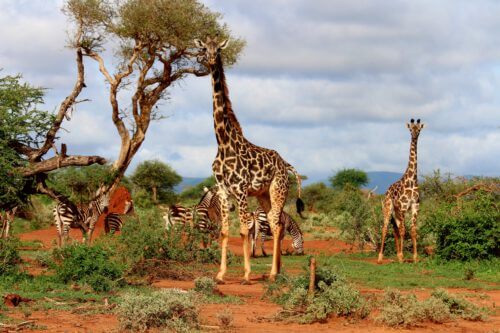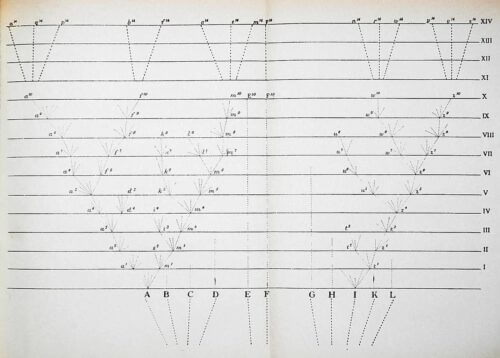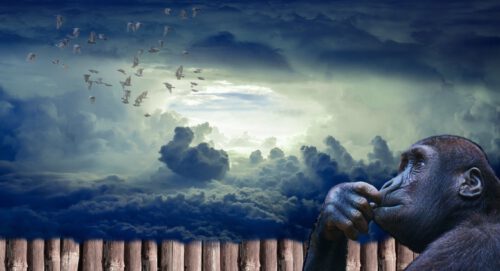The diversity and complexity of life on Earth is astounding: eight million or more living species, from algae to elephants, all evolved from a simple single-celled common ancestor about 3.5 billion years ago. But does this mean that evolution always and inevitably produces greater variety and complexity, with a predictable direction?
By: Matthew Wills, Professor of Evolutionary Palaeobiology at the Milner Center for Evolution, University of Bath, UK. Translation: Avi Blizovsky

The diversity and complexity of life on Earth is astounding: eight million or more living species, from algae to elephants, all evolved from a simple single-celled common ancestor about 3.5 billion years ago. But does this mean that evolution always and inevitably produces greater variety and complexity, with a predictable direction?
Charles Darwin identified three ingredients necessary for natural selection to occur. Individuals must be different and therefore there is variation in the population. They must also be able to pass this variation on to offspring. Finally, individuals must compete for resources that limit the number of offspring they can produce. Individuals with variations that allow them to obtain many resources may produce more offspring like them.
Evolution also depends on context and environment, which are constantly changing in unpredictable ways. For example, fish that begin to live and develop in unlit caves often lose their eyes, because the costs of their development outweigh their benefits.
Natural selection works from generation to generation. She cannot plan ahead or set a goal for herself. Additionally, not all evolutionary change is a response to selection, but can be neutral or random. It is not even guaranteed that more species will arise, as evolution can occur in a single lineage that may become extinct at any time. How can we reconcile such an aimless process with the complex diversity and complexity we see?
Ecological impact
Ecology and evolution are two sides of the same coin. The environment is not only the physical environment of an organism, but also the other biological species with which it interacts.
We can see this environmental interaction deep in the history of life. For billions of years "organisms" were stuck as single cells in the oceans. Several groups evolved independently into multicellular organisms (perhaps 25 times). However, the first complex animals, plants and fungi, with different tissues and organs, appeared only 540 million years ago, when the Cambrian "explosion" of species diversity occurred.
This explosion may have been caused by a rise in oxygen levels in the oceans, which was, in turn, the result of photosynthesis - the process by which plants and other organisms convert sunlight into energy, releasing oxygen. This process has been carried out by simple life forms for millions of years.
After the animals reached a larger size and developed intestines, hard parts, jaws, teeth, eyes and legs, complex food chains became possible - with "arms races" between predators and prey. Groups with adaptations that allowed them to live on land opened up even more opportunities. After conquering the land, it was already difficult to renew and increase the variety.

The only diagram in Darwin's "Origin of Species" shows species diverging over time. If more species survived than those that went extinct, then species richness increases. Darwin wondered if the ecological space could simply "fill up" one day.
But as far as we currently know, the number of species has only been increasing most of the time in the last 250 million years. Even natural mass extinctions in the past only caused temporary setbacks that created even more opportunities for diversification in the long run.
The variation is not random
Even as organisms evolve and become more complex, there will still remain certain aspects of their anatomy that cannot be changed. This is because genes, tissues and organs often have several different functions, so it can be difficult to improve one without spoiling something elsewhere.
For example, almost all mammals – from giraffes to humans – are stuck with only seven neck vertebrae. Every time other creatures evolve other anatomical problems arise. Birds are completely different, and seem to develop a new number of neck vertebrae with incredible ease: swans alone have between 22 and 25 neck vertebrae. But in general, as evolution produces new species, the flexibility in the body plans of those species may diminish as complexity increases.

Often, closely related species end up choosing similar paths. Furthermore, "developmental bias" means that anatomical change is not produced randomly.
Take for example the mammals. They evolved from a common ancestor, and took remarkably similar forms even though they lived on different continents. This is another example of the fact that evolution is not completely unexpected - there are not so many solutions to the same physical and biological problems as seeing, digging or flying.
The future of evolution
Clearly, there is an apparent contradiction at the heart of evolutionary biology. On the one hand, the mechanisms of evolution have no tendency to change in a certain direction. On the other hand, let these mechanisms kick in, and beyond some threshold, the intertwined ecological and developmental systems they produce tend to yield more and more species of greater maximal complexity.
Can we expect more diversity and complexity in the future? We are now at the beginning of the sixth human-caused mass extinction. It shows no signs of stopping and erases the results of millions of years of evolution. Despite this, humans themselves are too numerous, widespread and may soon bring themselves into serious danger of extinction. We will likely expand our range even further by engineering biologics on other planets.
On other planets we may one day find alien life. Will they develop on the same evolutionary path as life on Earth? The transition from unicellular to multicellular may be an easy hurdle to jump. Although it also came rather late on Earth, it nevertheless happened many times. A more complex evolution towards different tissue types has only evolved in a few groups on Earth, and thus it may represent a higher bar.
If alien biology manages to overcome certain obstacles, its evolution may indeed favor patterns of increasing diversity and maximum complexity. But perhaps the existence of a dominant and intelligent species like man will always be bad news for many of the other species on the planets where they evolve.
Astronomer Frank Drake proposed an equation to estimate how many intelligent civilizations might exist in our galaxy. One of the elements in the equation is how long such civilizations exist before they destroy themselves. Drake was pessimistic about this figure. Let's hope he was wrong.
https://theconversation.com/evolution-why-it-seems-to-have-a-direction-and-what-to-expect-next-139706

21 תגובות
It is very sad to see all the contempt for anyone who dares to challenge what is written here or evolution in general.
But I believe that the self-confidence of the scornful will slowly decrease as science progresses. In Israel of course 🙂
Avi Shalom,
I apologize for the previous comment (that's how you pull from the hip)
But I also want to explain
We relate to reality, to the results we get from experiments and manipulations in the same way that the same human experience is depicted in us. An experience that is the result of genes, education and reality of the past and continues, a cause and effect that has passed over our nervous system and consciousness.
We are not able to imagine that progress may actually result from changing our tools of perception.
We are used to a scientific experiment where there is an external variable that is manipulated and we record the results.
An experiment where the scientific touchstones dictate the manner of research.
My argument is that the new paradigm will require us to change our research tools, our desire. The same root, the filter that regulates the same sensory experience we experience.
In our world we are used to giving emphasis precisely to actions and deeds.
But action results from thought, and thought is a consequence of desire.
Food for thought…
my father
Philosophy is a theory that cannot be proven empirically
Science is what is perceived by the senses
In order to progress in the form of research we will have to change ourselves
Don't blame me if this new concept throws you the foundation stones that you were used to for years...
Yuvab, returning to the tools of mysticism and New Age is the opposite of progress.
Direction of evolution:
If in the 20th century the limits of reason were subject to the same conditions and criteria of the experimental laboratory, then in the 21st century the same limitations will be breached but will remain faithful to scientific research.
And that's how?
By upgrading and changing the research tools that until now were considered absolute.
Internal tools, separates of will, opaque of that inner essence of ours that a change in them will also change the limits of our current reason.
Recommended clip: https://youtu.be/h5BD3C1w_r8
It is desirable that the biologists get the help of mathematicians who are experts in chaos theory - a simple set of rules can create huge changes, random patterns as well as those that repeat themselves. It's quite interesting to compare it.
By the way - evolution makes it possible to create a new species every time a new resource becomes available (including if there is a new animal that can be devoured). This means that new species will always be created, as long as there is some bacterium that survived the holocaust that wiped out everything that came before. Just start from a starting point of 3.5 billion years ago instead of today.
Doron
Shouldn't you learn a little before writing so much nonsense? You don't know what evolution is, and it's a shame - you're just embarrassing yourself.
Nati
why lie?
Eddie
The only hole God left is between your ears. What you said about the octopus is simply a lie or ignorance.
Evolution is still a theory. That's why it shouldn't be called science. Missing among all elaborate production founding fathers. The chance that a mutated male will find a suitable female. Also the thought that humans and chimpanzees have remarkably similar dna. Chimps do not and will not have the cognitive abilities that humans have. What's more, religious extremism does not ruin their lives. Einstein, Niels Bohr, Newton and almost all the great physicists also believe that the world was created by an intelligence more developed than humans have.
Those who do not believe in the ability of random opportunism to produce significant results if only given enough time and enough tolerant "development laboratories", should check the history of the new corona virus. The principles of Darwinian evolution are supported by thousands of results of natural science research every day, even if summarizing "trends" on a scale of millions of years and billions of organisms, looks with a suspicious eye as "stories of retroactive rationalism". And in fact, the development of multicellular organisms from the symbiosis of unicellular organisms is not "natural" as implied in the article. About 3 billion years passed between the two steps in evolution: the creation of organisms that reproduce in the format of autonomous cells, and the development that makes it possible to bundle a package of genes destined for expression in different cells in a common inherited element (sperm or egg) so that they differentiated in the future into different types of cells adapted to different organs in different bodies and under different conditions different environment. In fact, in order to "invent" multicellularity, evolution had to "invent" the idea of the "development" of an embryo from a fertilized egg into a complex organism through the gradual development of the "genetic instruction book" without the prior existence of a standard creation mechanism, i.e. without a precedent of differential expression of genes - and of course without knowing in advance which desired result the mechanism develops by trial and error. And this is the most amazing story of evolution. Not that genetics-preserving molecules were created by replication, not increasing diversity by creating mutations that do not destroy the random attempts to improve the genome, and certainly not the fact that, in the end, natural selection will favor the changes that happened to "oversee" the aspects that were found to be more suitable for changed environmental conditions. It is easy to see why a primitive "eye" that sees which direction light is coming from improves the survival of an organism that has developed such an organ compared to an organism that is not even aware of the existence of light in the environment, but it is difficult to see why the genome created for this purpose is ready to integrate with a genome created to create a walking muscle on a common chromosome, Which they will both have to pair in a single act of fertilizing an egg (which also pairs similar genes) in order to serve the survival ambition of each one separately. Cooperation is an idea born in the gall of philosophical thinking, but nature has never wasted an opportunistic opportunity to fulfill a philosophical wish.
It's good and nice to read about evolution without the wrong usage
In the concept of "evolution-theory",
Because evolution is not a "theory" but a process
that there are various attempts and theories to explain it,
When you write the "theory of evolution" you put it in the hands of fools and ignoramuses
"Krodom to dig in", a tool for disputing the "theory",
But it turns out that fools and ignoramuses are not deterred
Even when the term "theory" does not appear,
And as evidence the reactions of: Eddie, Nati and their ilk
who are not ashamed to wave their ignorance in public...
The theory of evolution of a ruptured and unplanned development of types of organisms, and especially not of a ruptured development of an ancestor, does not and will not have a scientific basis. This theory only has shiny and prestigious covers of a kind of scientific academic ivory tower, and therefore, manages to attract attention even if it does not meet the criteria of research and scientific work. Scientific fairness obliges us that it is better to admit that we do not have any proof of how life on earth was created and also to admit that things we humans produce things (cars, airplanes, ships, etc.) Nature created them just like that in some kind of evolution, this is how it feels to practice the same human thinking regarding the wonderful production of animals in the sea on land and in the air and also plants and everything else, which did not come into being by themselves. You can easily recognize in them, planning thinking and prototyping production with planning of self-production (the culture) . The only evolution of the super engineers who designed the animals and plants is changes not of a functionally new organism, but only of adaptation to the environment such as skin color and not cardinal changes in the original design.
Thank you for taking the time to read my response
Best regards
Doron
A giraffe unequivocally disproves the current theory of evolution. There is no correlation between the time it would take for the giraffe's two heart systems to theoretically develop and the time it would take for their necks to elongate.
Ladi, your type of claim is called a claim based on ignorance, ignorance is not an excuse for you, these are a type
of an argument that is accepted in religious circles and is not unique to a particular religion, where you take a scientific subject
that has been researched reaches the edge of the current knowledge in the field (this is the area of ignorance) and from that you jump to some kind of conclusion that is actually baseless, it is not based on these facts on wishes and beliefs the only fact on which it is based is on ignorance and this does not sound stable, in the case of the octopus it is clear that the amount The fossils of a soft octopus, except for the original, will be smaller than a creature with a hard skeleton, so it will be more difficult to find continuity of fossils, but over time, the knowledge mosaic of fossils is also filled, and there is also genetics, so even in the field of the octopus, the fog about its origin has been clarified in recent years, and it is estimated that the octopus, squid, squid, another species of squid came from a common ancestor from about 100-160 million years ago.
Friends, you have good articles. Why not turn them into stories by launching a podcast?
Eddie
Very strong,
By the way, anyone who wants to be educated and learn more about evolution is recommended to read the "Ratio" website, a website that is written only by scientists with a relevant academic education.
What is behind this wonderful mechanism that knows how to regulate various developments so that they do not harm existing data?
Right Eddie, you close an eye
The octopus is not in the evolutionary development system, it has no ancestor and no construction system similar to any animal on earth. The creator of the world left a hole for every theory that cannot be bridged.
Is it possible that in the matter of the brain/memory, we are in an evolutionary process in which the brain (at this stage of human development)
"Learning" how to overcome/learn to retrieve information quickly from the huge "warehouse" of information created in our minds every day.
In my opinion, dementia and everything else is "stuck" because we are in the middle of a process where the brain learns how to store the astronomical amounts of information and how to organize them so that access and retrieval are accessible.
The young people of today in decades will reach the same situations where the adults are today. A huge stock of information and the brain will have to take control of it effectively!?